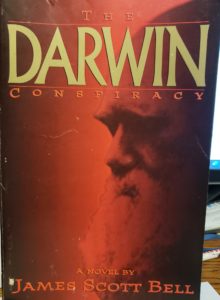
I’m not sure where we got it, but The Darwin Conspiracy by James Scott Bell has been in our house for a long time. I’ve been in writers conferences where Bell has been the keynote speaker or taught workshops, so I definitely wanted to read it.
It’s a novel, Bell’s first published novel, written in the 1990s when he was trying to transition from lawyer to writer. The plot is rather strange. It goes back and forth between the present day and times in the 19th century. Keeping them straight was difficult at first, easier at the end of the novel.
The premise is a document, called the Busby Manuscript. Sir Max Busby was the assumed name of a man who, as a boy, hated his father and killed him. He took on the name Max Busby and went to sea to avoid the law. The ship he sailed on was The Beagle, the same vessel on the same voyage that carried Charles Dawin on his famous round-the-world trip during which Darwin did the bulk of his formative research.
Busby sensed that the evolutionary theories that Dawin was just starting to develop would be disastrous to Christianity. Being an evil man, Busby wanted science to thrive and Christianity to suffer, and so egged Darwin on. As the story develops, Busby posed as an educated man (which he was not) and was with Darwin at every critical stage in Darwin’s work. Then he was with Darwin’s friends and every person who eventually touted the cause of evolution, right up to the Scopes Monkey Trial in 1925. Busby interacts with all the famous scientists and others who had a hand in either pushing evolution forward or fighting against it.
In order to accomplish this, Bell had to have Busby live to the age of 125+ years old. Not believable in the slightest, even in a novel where it is assumed you will suspend unbelief.
The book was complicated by 1) constant switching from present to 2) Busby writing his narrative in 1927 to 3) his days with Darwin and Darwin’s successors, a period of 90 years. Keeping these times frames straight was difficult, especially because often two were mixed in one chapter.
The novel was also complicated because Bell puts himself in it. He was the one who was given the Busby narrative by an old professor, only to lose it when the professor is killed, the police confiscate the narrative, and someone steals it from them. This whole scenario was, quite frankly, ridiculous. Having Geraldo Rivira make a cameo appearance was way over the top.
I rate this book just 3-stars. It would be two for the plot, but the writing is quite good and that pulls it up. But it is not a keeper. I don’t anticipate ever reading it again, nor recommending it to anyone else.